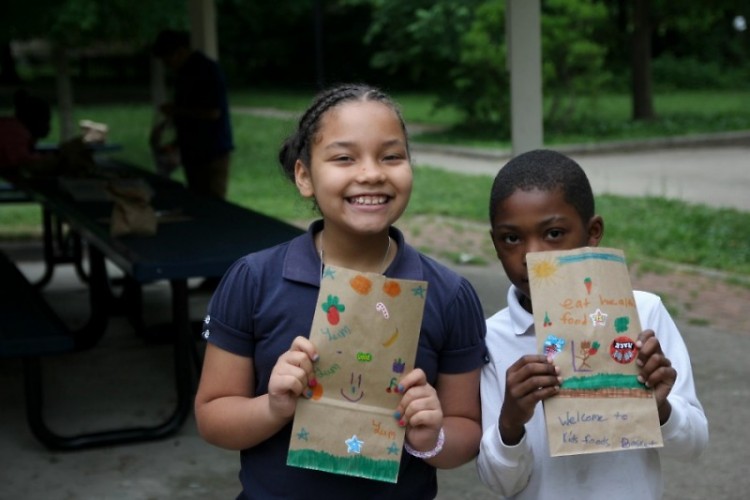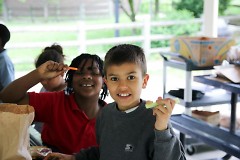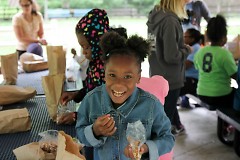Kids’ Food Basket has been providing nutritious evening meals to children in Grand Rapids for almost 15 years. In the last four years, they’ve expanded to serving children in Muskegon and Holland as well, and currently serving more than 7,500 children a ready-to-eat meal every week night throughout the school year and summer. They’ve gained an incredible reputation as an organization that makes volunteering fun and accessible, and have won a host of awards, including Greater Grand Rapids Chamber of Commerce’s 2014 EPIC Award for Nonprofit of the Year, MiBiz’s Best Managed Nonprofit Award for Excellence in Fundraising, and the 2010 Governor’s Service Award for Volunteer Program of the year.
Here are four fun facts you might not know about West Michigan’s’ little nonprofit-that-could:
1. Kids’ Food Basket has programming beyond providing meals for kids.
The organization has a unique focus on engaging and empowering youth in the attack on childhood hunger through their innovative Kids Helping Kids Program, operating on a strong belief that while 1 in 5 children may be affected by hunger, 5 in 5 have the power to help end it. Of the nearly 15,000 volunteers the organization sees each year, 33 percent are youth under the age of 18. Last year, alone, Kids’ Food Basket facilitated over 500 volunteer opportunities with area youth. In 2015, with support from the Steelcase Foundation, the organization also developed a civic engagement lesson plan series that is currently conducted at the schools Kids’ Food Basket serves. After completing the lessons, many seventh grade students at Harrison Park School increased their leadership capacity, signing-up as volunteer readers for a summer reading program for elementary students, helping raise money for their school garden, and volunteering at Kids’ Food Basket.
“I have always believed that awareness and opportunity can make a difference for students, parents, and communities. But to see this dramatic change has been quite remarkable,” said Gwen Heatley, Career/College Coordinator at Harrison Park. “We are deeply grateful for the Civic Engagement program and are witnessing the power of this amazing [civic engagement] classroom series here at Harrison Park School.”
2. Kids’ Food Basket has a Family Engagement Initiative to intentionally include families they serve as a partner in programming. Kids’ Food Basket’s Family Engagement Initiative continues to grow as they strengthen relationships with the families they serve. They believe their families have the inherent capacity and wisdom to affect change, and therefore are a vital partner in program service. Kent Schools Services Network (KSSN) remains an important partner and connector to families in schools. Kids’ Food Basket staff attends monthly Community School Leadership Team meetings at multiple schools and participate in events on a regular basis in the community, such as school carnivals, festivals, and neighborhood block parties. Because of this, the organization is seeing an increase in the number of parents of service recipients that volunteer to pack meals and feel welcome volunteering at Kids’ Food Basket. As part of their strategic plan, Kids’ Food Basket is actively creating ways to invite parent volunteers to join committees that help direct programming.
3. Kids’ Food Basket is passionate about sustainability.
In 2010, Kids’ Food Basket moved its headquarters to a rental facility on Oak Industrial Drive. In renovating the space, they focused on LEED-certified materials and making their operation more sustainable. Kids’ Food Basket’s commitment to environmental-friendliness includes composting using local vendor, OrganiCycle, strict recycling practices, and using local vendors and produce farmers whenever possible.
4. Kids’ Food Basket is exploring educational programming initiatives.
Partnerships with area farmers, school administrators, and service families have led Kids’ Food Basket to explore urban agriculture as a way to attack childhood hunger, and the organization added urban farming as a part of its 2015-2018 strategic plan.
“We were hearing themes from educators about how disconnected many of the kids we serve are from healthy food,” Executive Director, Bridget Clark Whitney, shared. “At Palmer Elementary, our Kids Helping Kids staff was facilitating a lesson plan with Master Gardeners on healthy food, and they were showing photos of plant root structures, carrots in the ground, that sort of thing. A little girl raised her hand and asked ‘Why would anyone shove carrots in the ground like that?’ That was a wake-up moment for us.”
Kids’ Food Basket is still in early stages of learning about urban farming programming. Staff have been participating in educational sessions with Grand Rapids-based nonprofit Urban Roots at a learning garden installed at their headquarters facility on Oak Industrial Drive, and visiting food justice-driven farms locally and across the state, including New City Urban Farm, Earthworks, Forgotten Harvest Farm, Windy City Youth Farm, Growing Home, and The Plant.
“It’s been amazing to partner with Urban Roots,” Clark Whitney shares. “We’re eager to learn and explore in this new area, because we know we can’t have strong communities without strong kids. We’ve been filling a critical need with Sack Suppers for nearly 15 years - and through doing that, we’ve learned that hunger is both a symptom, and a cause, of poverty. Now, we’re ready to attack childhood hunger from both sides: alleviating the burden of hunger with the Sack Supper, and ensuring kids are set-up for success with additional, innovative programming. We’re very excited to give our West Michigan community opportunities to attack childhood hunger more holistically in the near future.”
The Rapidian, a program of the 501(c)3 nonprofit Community Media Center, relies on the community’s support to help cover the cost of training reporters and publishing content.
We need your help.
If each of our readers and content creators who values this community platform help support its creation and maintenance, The Rapidian can continue to educate and facilitate a conversation around issues for years to come.
Please support The Rapidian and make a contribution today.



